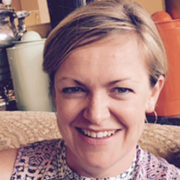Early 2023 conference

Lactation Conversations
Online March - June, 2023
Lactation Conversations, our 22nd online breastfeeding conference in English, covers a wide range of topics to inform and guide your clinical practice and to inspire and challenge your thinking about breastfeeding, nutrition and human lactation.
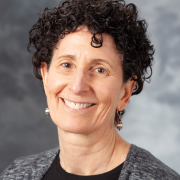
Low milk production among parents of premature or ill infants
Anne Eglash, MD, IBCLC, FABM - Read moreLow milk production among parents of premature or ill infants
Anne Eglash, MD, IBCLC, FABM
Dr Anne Eglash is a clinical professor with the University of Wisconsin School of Medicine and Public Health, in the Department of Family and Community Medicine. In addition to family medicine, she has been practicing breastfeeding medicine since 1994.
She is also a co-founder of the Academy of Breastfeeding Medicine, the Medical Director and co-founder of the Mothers’ Milk Bank of the Western Great Lakes, and the Medical Director of the University of Wisconsin Breastfeeding and Lactation Medicine Clinic. She has published many peer- reviewed articles on breastfeeding medicine and had been an associate editor for Breastfeeding Medicine Journal.
Dr Eglash is founder and president of The Institute for the Advancement of Breastfeeding and Lactation Education (IABLE), as well as a cofounder and the inaugural president of the North American Board of Breastfeeding and Lactation Medicine.
Low milk production among parents of premature or ill infants
Lactating individuals who are pump dependent have unique challenges to establishing and maintaining milk production. We will review underlying causes and treatment options to optimize milk production in this population.
1.25 L (III,IV,VI,VII) CERP
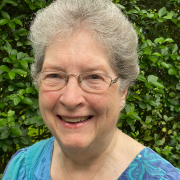
What to do when the baby has not latched on yet or is sucking ineffectivelyandBreastfeeding case reports
Kay Hoover, MEd, IBCLC - Read moreWhat to do when the baby has not latched on yet or is sucking ineffectivelyandBreastfeeding case reports
Kay Hoover, MEd, IBCLC
Kay Hoover became an International Board Certified Lactation Consultant in 1985. She has worked as a private practice lactation consultant, a hospital lactation consultant at 5 different hospitals, the lactation consultant for the Philadelphia Department of Public Health, for The Center for Childhood Obesity Research at The Pennsylvania State University, and the Pennsylvania Department of Health. She served on the IBLCE board from 1995-2001. She currently is retired. Kay has presented workshops at national and international conferences and is a co-author of The Breastfeeding Atlas.
What to do when the baby has not latched on yet or is sucking ineffectively
This presentation covers techniques to help newborns learn to breastfeed, such as skin-to-skin care, hand expression of milk, enticing the baby to the breast.
2.25 L (III,VI,VII) CERP
Breastfeeding case reports
This presentation covers a variety of cases covering painful nipples, nutrient deficiencies, various colors of human milk, and large nipples.
1.00 L (VII) CERP
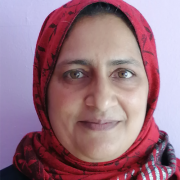
The 2022 ABM mastitis protocol simplified
Rahmat Bagus, MBChB, IBCLC - Read moreThe 2022 ABM mastitis protocol simplified
Rahmat Bagus, MBChB, IBCLC
Dr Rahmat Bagus is a general practitioner with a special interest in paediatrics and breastfeeding management. She is also an IBCLC and La Leche League Leader and serves as the Professional Liaison Leader for LLL South Africa.
The 2022 ABM mastitis protocol simplified
Simplifying the new ABM Mastitis Protocol, looking at blebs and blocked ducts with a new lens. Understanding the underlying pathophysiology and having a look at the new guidelines, using case studies to highlight important aspects of the new management.
1.50 L (III,VII) CERP
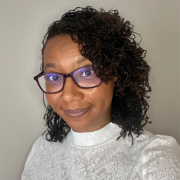
Lactation crutch phrases: when was the last time you cleared your cache?
Erika Dudley, IBCLC, CBS - Read moreLactation crutch phrases: when was the last time you cleared your cache?
Erika Dudley, IBCLC, CBS
Erika Dudley is a Private Practice IBCLC and owns Enriched Lactation based out of Indiana, USA. Erika has been professionally supporting breastfeeding/ chestfeeding families for over 3 years from prenatal through toddlerhood. Her goal is to empower parents with understanding that there is value in their effort and action to provide human milk to their little ones. Erika educates tailored to a families goal and with intention of showing the value of lactation support to serve as a ripple effect to future care.
Erika is also the creator and host of the Leveling Up in Lactation podcast. It is a passion project that highlights, amplifies, and documents the journeys of Black Lactation Professionals.
Lactation crutch phrases: when was the last time you cleared your cache?
“Why did they tell me to do [insert outdated or out of context saying about lactation]?” We know that in some settings our length of time with a family is limited. Our words, tone and the relevancy matter. Oftentimes we have some cliff notes of breastfeeding information we share but when’s the last time we did an assessment to see if our spiel is still relevant or even harmful? This presentation will shine a light on how we can impact the trajectory of a family’s journey with words and explore ways to update our phrases in an evolved, “user-friendly” way.
1.25 R (IV,VII) CERP
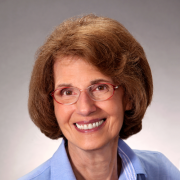
The infant formula shortage: what are we short onandChrononutrition... or can breastmilk tell time?
Marsha Walker, RN, IBCLC - Read moreThe infant formula shortage: what are we short onandChrononutrition... or can breastmilk tell time?
Marsha Walker, RN, IBCLC
Marsha Walker is a registered nurse and international board certified lactation consultant. She has been assisting breastfeeding families in hospital, clinic, and home settings since 1976. As such, she advocates for breastfeeding at the state and federal levels. She served as a vice president of the International Lactation Consultant Association (ILCA) from 1990-1994 and in 1999 as president of ILCA. She is a previous board member of the US Lactation Consultant Association, Baby Friendly USA, Massachusetts Lactation Consultant Association, and the Massachusetts Breastfeeding Coalition. She serves as Associate Editor of Clinical Lactation, and a board member of the National Lactation Consultant Alliance. Marsha is an international speaker, and an author of numerous publications including ones on the hazards of infant formula use, Code issues in the US, and Breastfeeding Management for the Clinician: Using the Evidence, 5th edition.
The infant formula shortage: what are we short on
The response to the infant formula shortage in the United States focused on increasing access to infant formula. The formula shortage was caused by a convergence of factors including market concentration of formula manufacturers, lax federal policies, supply chain issues, short-sighted legislators and policy makers, and regulations favoring the the continued monopoly in formula manufacturing. Absent from the response and discussion was how to reduce the demand for infant formula. This presentation will review the multiple contributors to the formula crisis, the players involved in precipitating the formula shortage, and interventions to reduce the demand for infant formula.
1.00 E (VII) CERP
Chrononutrition… or can breastmilk tell time?
Circadian rhythmicity is demonstrated in various breastmilk components. Breastmilk is often fed to infants at a time of day different from the time it was collected. Does this mean we need to change our recommendations for feeding expressed milk? This presentation will explore why infant circadian rhythm development is important, the circadian rhythms of breastmilk components, the potential effects of consuming mismatched breastmilk, and potential interventions based on chrononutritional concepts.
1.00 L (I) CERP
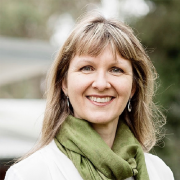
Positional asymmetries, breastfeeding and the ATNR
Joanna Strybosch, B.AppSc(Clin.Sc)/B.OsteoSc, Grad Dip Paeds, IBCLC - Read morePositional asymmetries, breastfeeding and the ATNR
Joanna Strybosch, B.AppSc(Clin.Sc)/B.OsteoSc, Grad Dip Paeds, IBCLC
Dr Joanna Strybosch has practiced as a registered Osteopath for over 26 years and certified as an IBCLC in 2019. She is also a Rhythmic Movement Training (RMTi) Consultant. In 2021, Joanna was titled an Advanced Paediatric Osteopath by Osteopathy Australia, in recognition of her long-standing commitment to collaborative paediatric care, tertiary education and continuing professional development.
Joanna is passionate about supporting mothers in their early parenting journey. She has a particular clinical interest in supporting mothers and babies with feeding difficulties and she combines her expertise in both osteopathy and lactation to provide a holistic approach to maternal-infant health care and lactation support.
This includes treatment of babies experiencing birth strain and injury, as well as management of torticollis, plagiocephaly and hip dysplasia.
Joanna’s work includes releasing connective tissue tensions throughout the body, especially following traumatic birth, optimising positioning and latch, improving sucking skills, as well as support of infant with ankyloglossia.
Joanna works in private practice in Melbourne at a medical clinic, alongside GP’s, MCHN, and other allied health professionals.
Positional asymmetries, breastfeeding and the ATNR
Congenital muscular torticollis and deformational plagiocephaly are two of the most commonly encountered asymmetries of infancy, affecting the head and neck. An understanding of these conditions and how they impact the infant is helpful when providing lactation support to the breastfeeding dyad. This presentation will consider the role of the Asymmetric Tonic Neck Reflex (ATNR) in breastfeeding and how this reflex is impacted by positional asymmetries.
Osteopathic treatment and management of these conditions will also be considered.
1.00 L (III,VI,VII) CERP
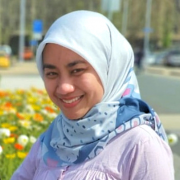
Social value of BFHI and Ten Steps in Australia and Indonesia
Andini Pramono, BSc, MPH, IBCLC - Read moreSocial value of BFHI and Ten Steps in Australia and Indonesia
Andini Pramono, BSc, MPH, IBCLC
Andini is an IBCLC and now in her final year of PhD at the Australian National University. Her PhD thesis is looking at the facilitators and barriers of Baby Friendly Hospital Initiative implementation and accreditation in Indonesia and Australia. One of her PhD papers was measuring the social value of BFHI implementation and accreditation using Social Return on Investment. Her journey began when she was pregnant with her first child and was very clueless of how to feed her, then found and attended full series of Indonesian Breastfeeding Mothers Association (AIMI)’s breastfeeding classes. She then decided to volunteered as breastfeeding counsellor at AIMI. With her work experience in hospital management consulting for 8 years and personal experience when her breastfed son undertook open heart surgery, she realized that not every hospitals provide adequate education and support for breastfeeding mother, either since pregnancy, during and after birth.
Andini was awarded the Deeble Summer Research Scholarship from Deeble Institute for Health Policy Research Scholarship Program of Australian Healthcare and Hospitals Association (AHHA) in 2020 and published a Health Policy Issues Brief titled “Improving the Uptake of the Baby Friendly Health Initiative in Australian Hospitals” as the outcome. Thanks to her supervisor, Andini involved in working group for Breastfeeding Friendly Workplace Accreditation at ANU in 2018-2019 and involve in WBTi Australia since 2019. Currently living in Canberra Australia, Andini has been providing breastfeeding education and assistance for Indonesian mother-student, students’ wives or any Indonesian women who live in Canberra.
Social value of BFHI and Ten Steps in Australia and Indonesia
Breastfeeding has positive impacts on the health, environment, and economic wealth of families and countries. The World Health Organization (WHO) launched the Baby Friendly Hospital Initiative (BFHI) in 1991 as a global program to incentivize maternity services to implement the Ten Steps to Successful Breastfeeding (Ten Steps). These were developed to ensure that maternity services remove barriers for mothers and families to successfully initiate breastfeeding and to continue breastfeeding through referral to community support after hospital discharge. However, in 2022 only 26% of Australian hospitals were BFHI-accredited, and only 8% of government hospital in Indonesia were implementing Ten Steps in 2011. So what is the social return to investing in BFHI and Ten Steps implementation in Australia and Indonesia?
This study aimed to examine the social value of maintaining the BFHI accreditation in one public maternity unit in Australia and implementing Ten Steps in one hospital in Indonesia using the Social Return on Investment (SROI) framework. This novel method was developed in 2000 and measures social, environmental and economic outcomes of change using monetary values.
0.75 L (VII) CERP
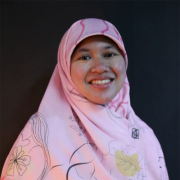
Induced lactation, journey to be a mahram
Gracia Azra Lestari, MD, IBCLC - Read moreInduced lactation, journey to be a mahram
Gracia Azra Lestari, MD, IBCLC
Dr Gracia Azra Lestari is working as a medical doctor’s civil servant at Sindang Barang Public Health Center Bogor – Indonesia. She is also a volunteer at a breastfeeding community Asosiasi Ibu Menyusui Indonesia (AIMI) Branch Bogor since 2011 and now as a chief since March 2022. She is also volunteer at Indonesian Red Crescent since 2016. And was IBCLC’s certified in 2015 and recertified in 2020. She is a mother of three daughters (12 years old, 10 years old, and 5 years old) and all of them were breastfeed until 3 years old.
Induced lactation, journey to be a mahram
Induce lactation is a method of stimulating milk production in women who are not pregnant. An adopted child can become a mahram for his adoptive mother if the mother manages to breastfeed the baby at the maximum age of two years, and satisfies at least five feedings.
0.75 L (II,V,VI) CERP
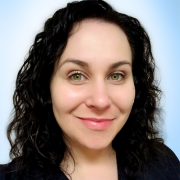
PCOS and lactation
Megan Dunn, BS, IBCLC - Read morePCOS and lactation
Megan Dunn, BS, IBCLC
Megan Dunn is a board certified Lactation Consultant and Health Educator who holds a Bachelor of Science in Anthropology and Sociology. This educational background informs her understanding of the social and cultural complexities of the infant feeding relationship. With more than 15 years serving families, her experiences have run the gamut as a volunteer, peer-to-peer counselor, clinical IBCLC, and as an educator for parents and professionals. Currently she is the Breastfeeding Program Coordinator for the local Public Health agency where she is coordinating a pilot program to equitably expand peer-to-peer support. She is privileged to be a part of the excellent Women’s Health Education team in her local health care system as well as a provider for in-home lactation consultations for her community. She seeks to support biological feeding norms while offering practical and empowering solutions for dyads.
PCOS and lactation
This presentation examines the four types of PCOS and their role in metabolic function and the potential impacts on lactation.
Participants will learn how to interpret lab results, which interventions are safe and effective to support milk production, how to address implicit personal bias which results in poorer outcomes for obese parents, and learn about systemic changes, and consult techniques which improve lactation outcomes for all families. She is a supporter of the LGBTQ+ and neurodiverse communities and a member herself.
As an international speaker, Megan, seeks to advance lactation knowledge and skills through evidence based practices supported in a trauma-informed environment.
1.50 L (II,IV,VI) CERP
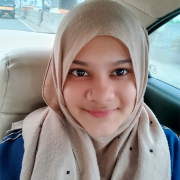
Clubfeet and exclusive breastfeeding
Ayisha Chandni, MS, CCCE, ICBD, ACLP, IYCF - Read moreClubfeet and exclusive breastfeeding
Ayisha Chandni, MS, CCCE, ICBD, ACLP, IYCF
Ayisha Chandni is a Maternal and Infant Support Practitioner who supports women in pregnancy, labour, birth and postpartum. She specializes in helping women achieve their desired birth and breastfeeding goals and in helping them feel confident as they step into motherhood. She is also a social worker who works with underprivileged girls and women and helps them obtain the education and skills needs for employment.
Clubfeet and exclusive breastfeeding
In this presentation, we will be discussing the challenges clubfeet and its treatment has on the breastfeeding dyad. We will also be talking about how we as lactation professionals can help them better and improve their breastfeeding experience.
0.75 L (I,III,VI) CERP
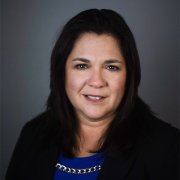
Addressing burnout: put the CARE back in caregiver
Annette Leary, RN, BSN, IBCLC - Read moreAddressing burnout: put the CARE back in caregiver
Annette Leary, RN, BSN, IBCLC
Annette Leary is a registered nurse with over 33 years of experience working in Maternal Child Health (pediatrics, postpartum, home health care and level 2 nicu). She became an IBCLC in 1995 and owns a private practice providing office, and virtual visits Orlando Lactation and Wellness. She formed a collaborative company Baby B.L.I.S.S. : Central Florida Feeding Collaborative. Which helps families prenatally, antepartum and post partum families navigate the growth , development and feeding journey of their children.
She began Upledger Craniosacral therapy training in 2015, taking advanced maternal and pediatric specialty classes. She finds great improvement incorporating craniosacral therapy techniques with lactation consulting. Helping Families Latch onto Parenting has always been Annette’s mantra.
Addressing burnout: put the CARE back in caregiver
This presentation will start with recognizing and identifying signs and symptoms that lead to disengagement aka burnout in our work. And then discuss the manifestations of emotional and physical reactions threatening sustainability and then identify strategies to cope, recover, and recharge.
1.00 R (VII) CERP
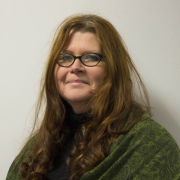
Relational research and building liquid bridges
Tanya M Cassidy, PhD, AM, MA, BA - Read moreRelational research and building liquid bridges
Tanya M Cassidy, PhD, AM, MA, BA
Dr Tanya Cassidy is a senior medical social scientist with specialisms in anthropology, sociology, and psychology, having received her PhD from the University of Chicago, USA. Originally from Canada, she has now lived and worked in Ireland for most of her adult life. Her current research focuses on the global story of bodily generosity – in particular, the exchange of human milk, including donation. Tanya has studied these topics across European with a prestigious EU Horizon 2020 Marie Sklodowska Curie Award (MSCA). She subsequently received a Fulbright-HRB Health Impact award to travel to the Department of Anthropology at MIT where she conducted a study of mothers (many of whom were both Irish and Canadian immigrants) who donated to one of the first donor human milk services in the world, located in Boston in 1910. She is the lead author of the monograph Banking on Milk (Routledge, 2019), and over 50 articles and the editor of several volumes. A member of the European Milk Banking Association (EMBA) from its inception, she recently joined their board. She is also ethics advisor to the UK Milk Banking Association (UKAMB). She is also a member of the board for the journal Maternal and Child Nutrition (MCN) and for the Journal of Human Lactation (JHL).
Relational research and building liquid bridges
What do we mean by human milk relations, and why is it important. By tracing the disciplinary discussions of the concept of relations, we will talk about how ethnographic research on social relations contributes to understanding key health interventions, especially related to maternal and infant health.
0.75 L (VII) CERP
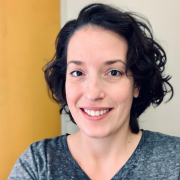
Breastfeeding and climate change
Sandra Zadkovic, BA (Hons) - Read moreBreastfeeding and climate change
Sandra Zadkovic, BA (Hons)
Sandra Zadkovic is a proud mother, breastfeeding peer support volunteer, and non-profit sector worker where she has been a part of organizations addressing health, food security, and environmental issues. Her personal breastfeeding experience sparked an interest and passion for protecting breastfeeding rights. As a student in the Ecological Public Health course at the University of Toronto’s Dalla Lana School of Public Health, Sandra explored the historical and ongoing intersections between breastfeeding and climate change, presenting her research in the article Breastfeeding and Climate Change: Overlapping Vulnerabilities and Integrating Responses published in the Journal of Human Lactation in April 2020. The goal of her research is to urge health professionals, policy makers, non-profit organizations and breastfeeding advocates everywhere to recognize the systemic roots of breastfeeding subversion and work in solidarity with other anti-oppressive movements, including the climate justice movement.
Breastfeeding and climate change
Informed by an ecological public health approach, this talk will examine the relationship between two overlapping global public health challenges that disproportionately impact women and children: climate change and breastfeeding subversion. We will explore root historical causes and contemporary overlapping vulnerabilities guided by political ecological and ecofeminist theory and visualized through a co-mapping of global climate risk and breastfeeding rates. Informed by this analysis, we will explore pathways for change from the ground up by focusing on solidarity across social and environmental justice movements.
0.75 E (VII) CERP
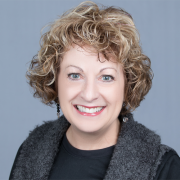
Choices in lactation after loss
Kathy Parkes, MSN-Ed, BSPsy, RN, IBCLC, FILCA, CHC, CAHPE - Read moreChoices in lactation after loss
Kathy Parkes, MSN-Ed, BSPsy, RN, IBCLC, FILCA, CHC, CAHPE
Kathy Parkes is a sought-after speaker and webinar presenter as well as a published author. She has lived all over the world, settling in San Antonio, Texas after her Air Force husband retired. Kathy is a Registered Nurse with a Masters in Nursing Education and received her International Board Certified Lactation Consultant designation in 1992. Her private practice, Breastfeeding Perspectives, adds to her over 30 years of lactation experiences, which include WIC staff and clients, in-patient hospital work on L&D, postpartum, and NICU, taking a hospital to Baby-Friendly designation, setting up a lactation visitation program for both a home health agency and for the largest birth doula organization in San Antonio, and providing home and office lactation visits for private clients. She specializes in tethered oral tissues (tongue-and-lip ties), milk supply problems, multiples, and preterm/late preterm infants.
On the fun side, Kathy met her husband of 47 years as she was jumping out of the airplane he was flying. (You could say she fell for him!) She loves animals, traveling, and gardening. Most of all, she loves teaching others about breastfeeding.
Choices in lactation after loss
Milk production can occur following a loss from 12 weeks gestation to and following birth. Lactating parents have choices about what to do with that milk and should be informed of those choices. This presentation serves to introduce the attendee to a variety of choices to be able to serve their clients well.
1.50 L (V,VI,VII) CERP
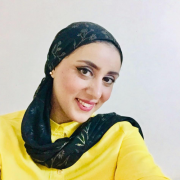
Breastfeeding and gut (the magic formula)
Nada Atef, MBChB, IBCLC - Read moreBreastfeeding and gut (the magic formula)
Nada Atef, MBChB, IBCLC
Dr Nada Atef is a specialist in pediatrics and prepared her doctorate degree in pediatrics (Ain Shams University, Cairo, Egypt) with published research in pediatrics gastroenterology.
In 2015 she obtained her master degree from Ain Shams University with special interest in pediatric gastroenterology and endoscopy. She has now
trained for almost 7 years in Ain Shams University the gastroenterology unit.
To add more knowledge and for her personal need as a mother of two daughters she became interested in lactation.
Since 2010 she has been working in the Mansheyet El Bakri Hospital, Cairo, Egypt for the Ministry of Health as a neonatalology specialist.
Breastfeeding and gut (the magic formula)
In this presentation we discover through interesting cases studies in pediatric gastroenterology that breastmilk supply should be continued with some modification on mother diet and behaviours to make it (the magic formula) away from the specialized therapy formula which is not available in developing countries and is costly as well.
0.75 L (I,II,III) CERP

